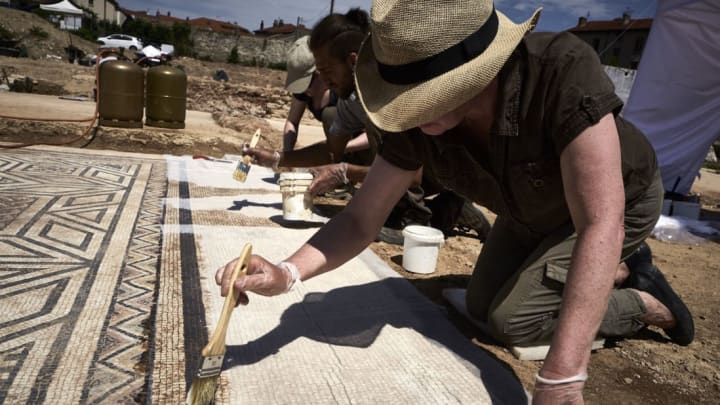Newly uncovered ruins in France are drawing comparisons to one of the most famous archaeological sites of all time. Like Pompeii, the ancient Roman neighborhood discovered beneath the town of Vienne has been preserved beneath a layer of ash for nearly 2000 years, The Guardian reports.
Ground had just been broken on a 75,000-square-foot housing complex in Vienne, which is south of Lyon, when the discovery was made. After excavating the site, archaeologists saw it contained the remains of an entire district of a Roman village last inhabited during the 1st century CE. A series of fires appears to have swept through the town, driving out residents and destroying buildings. Whatever structures and objects survived the initial blaze were entombed in a protective coating of ash until they were brought to light earlier this year.

Among the debris, archaeologists came across the ruins of a home they believe once belonged to a wealthy merchant. The roof, balcony, and first floor have all crumbled away, but a tiled floor illustrated with mythological characters remains. Another mosaic they unearthed depicts Thalia, the muse of comedy, being kidnapped by Pan, the god of satyrs. In a different part of the site, a public building (possibly a school of philosophy) houses a fountain complete with a statue of Hercules.

When it was overtaken by Rome in 47 BCE, Vienne became a communication center for the empire. Many impressive structures, including an 11,000-seat theater, are left over from the era, but the discovery of "little Pompeii" is in a category all its own. Lead archaeologist on the dig Benjamin Clement told The Guardian that it's "the most exceptional excavation of a Roman site in 40 or 50 years."
Archaeologists have been excavating the site since April and will have until the end of the year to recover the rest of the relics. Many of the pieces that have already been collected will be restored with plans to display them in Vienne's museum of Gallo-Roman civilization in 2019.

[h/t The Guardian]
